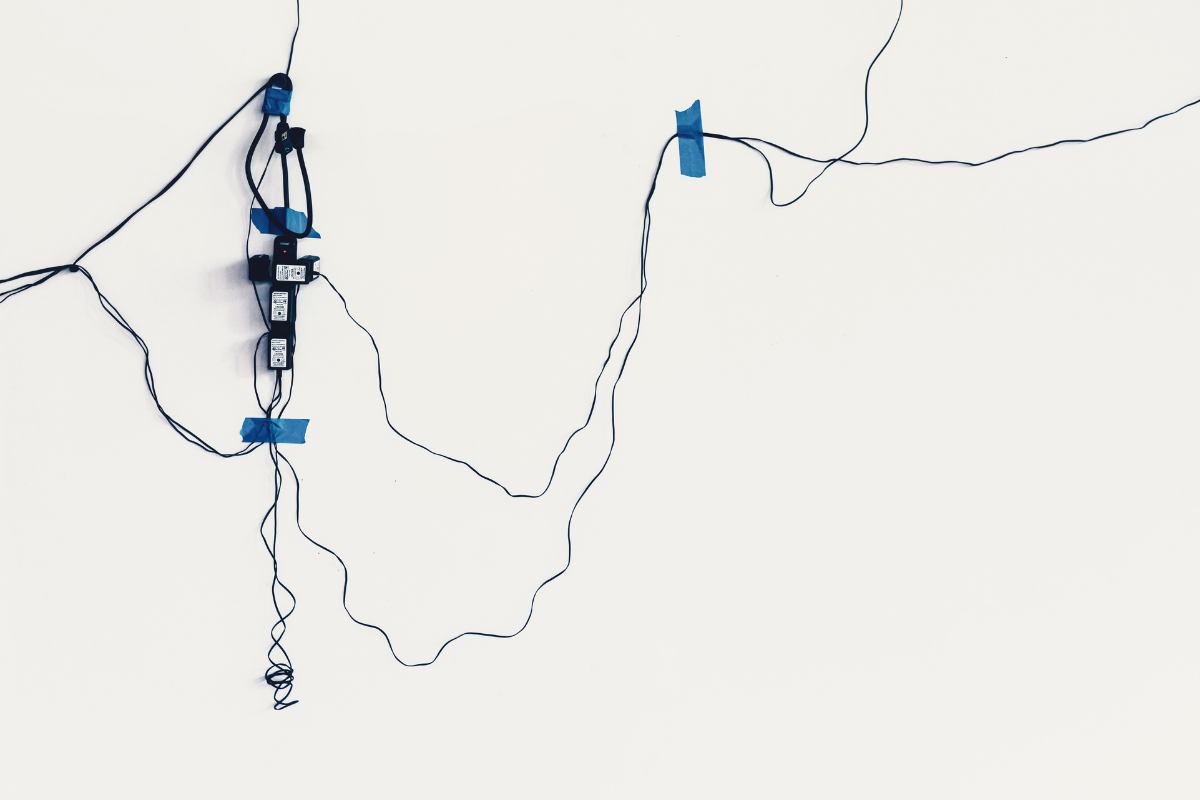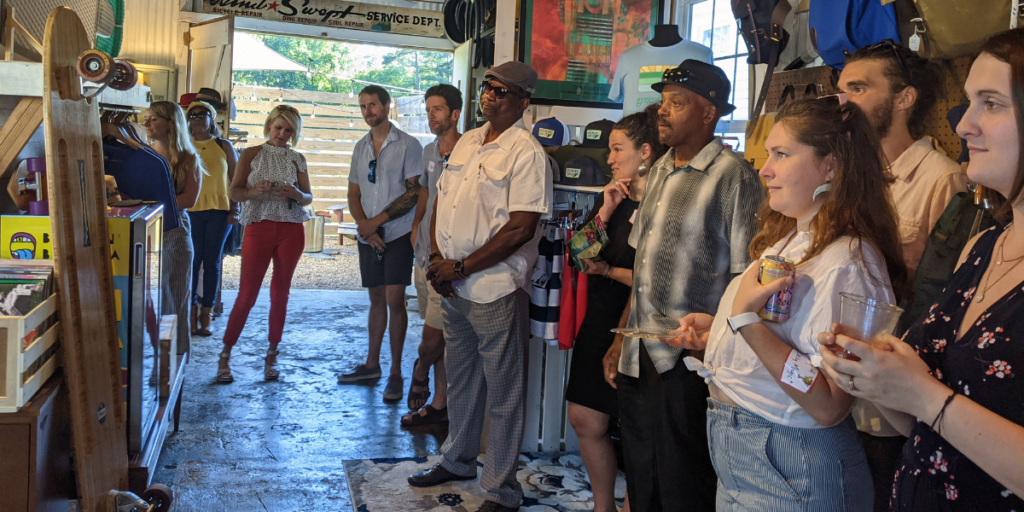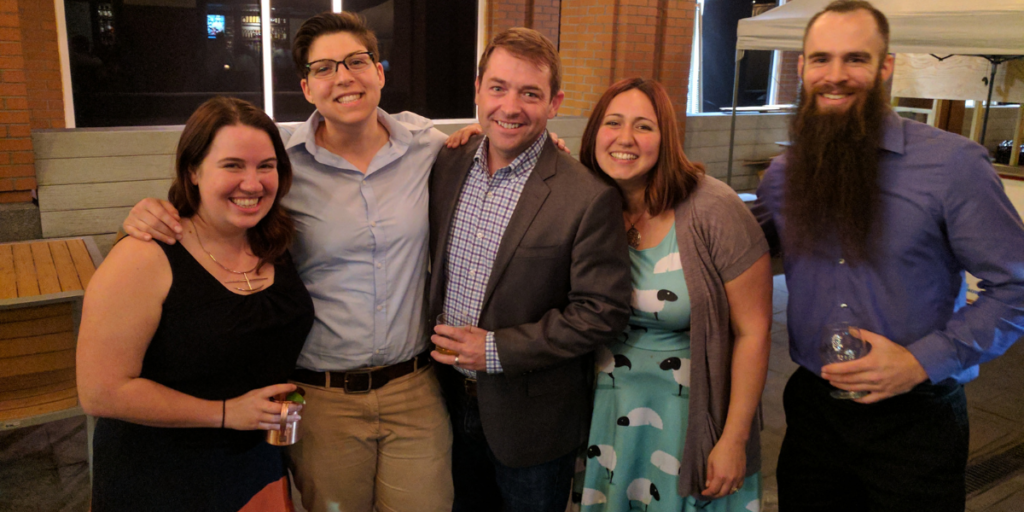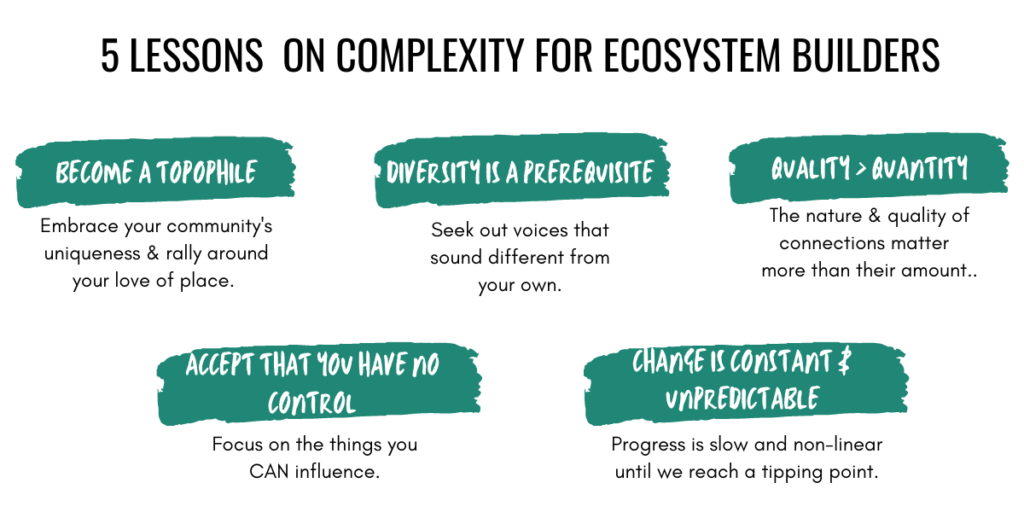
Complexity as a mindset
Why thinking in complex adaptive systems makes us better ecosystem builders.
My phone rings on a Thursday morning. “Why is ecosystem building so addictive?” It’s my friend Larkin, community builder and small business advocate extraordinaire. I know how she feels. I’ve been giddy and restless since we returned from an ecosystem building event in Irvington, VA, the day before. My mind is buzzing with excitement over the opportunities for the entrepreneurs in the Northern Neck region. It’s a constant buzz in the back of my mind, a tingling sensation in my finger tips. This is how addicts must feel.
Rewind to two days prior: I drove three and half hours to Virginia. Oyster bars, surf shops and the occasional vineyard lined the streets that almost made me forget that I was still inland surrounded by fresh water: the Chesapeake Bay. Irvington is a small rural community that – despite only having only one main intersection – is bustling with a few restaurants, a coffee shop, bed and breakfasts, wine bar and a Steamboat Era Museum. Even though this little water’s edge village only counts a population of 500, Larkin was able to rally entrepreneurs, small business owners and community builders from the entire region to get together at Wind Swept Experience and Supply to talk about what’s working for local entrepreneurs and what isn’t.

Larkin and her colleague Tom Chapman, fellow ecosystem builder and metrics expert, have been deeply involved in assessing the entrepreneurial fabric of different regions throughout Virginia to advise policy makers and entrepreneurial support organizations on how to better support local entrepreneurs. While the research, stakeholder interviews and reporting are fascinating, I know that meeting entrepreneurs in person is what gives her life. I get it, because I feel the same. Something powerful happens when you get small business owners, startup entrepreneurs and those who support them (economic developers, marketers, small business banks, tourism councils, etc.) in a room to talk about what they want for their community, and how they might be able to make it happen together. What they all have in common is a dedication to seeing their village, town, city or region thrive, and the willingness to roll up their sleeves to get it done. In an informal setting, they have a chance to connect on a personal level and talk openly about what’s working and what isn’t for their businesses. When Larkin and I both worked in Richmond, VA, she regularly hosted a similar format – the Salon for Entrepreneurs: no agenda, no programming, merely a chance for entrepreneurship practitioners to catch up and mingle. While these events are never replicable, their effect is: Those in the room feel a sense of camaraderie and share a love of place (also called topophilia). I firmly believe that this is how community happens. It’s what makes ecosystem building so addictive. Once you’ve had a taste of the power of entrepreneurship as a force to drive change, it’s hard to shake. You always come back for more.
Mindset over Skills
I’ve written a lot about the key skills of an entrepreneurial ecosystem builder. What I have discussed less, however, is the very foundation of doing this work: The desire to see your community thrive by unleashing the power of entrepreneurship. You can train entrepreneurship supporters and practitioners all you want, if they don’t have the right mindset of doing what’s best for the community – as sometimes opposed to the best for their organization – no training will take.
It’s fair to say that neither Larkin nor I relish hierarchical structures when it comes to supporting entrepreneurs. We both had our fair share of run-ins with the powers that be when it came to being of service to local founders. Herein lies our love for the ecosystem building approach: Everyone is invited. Instead of assuming that a handful of people within the higher and well paid ranks of a community know what entrepreneurs at the grassroots need (hierarchy), the beauty of building and nurturing ecosystems from the bottom up comes from connecting in person and making space for these conversations to happen (network approach). You don’t need to be a sanctioned, trained or bona fide ecosystem builder to start championing business in your community. You just start and find your niche in the ecosystem that fits your skill set and desire to be involved.
Hierarchy out, self-organizing networks in
Ecosystems are best understood as complex, adaptive systems. They allow, and in fact require, everyone with a genuine interest in seeing their local entrepreneurs succeed, to participate, contribute and actively shape their local ecosystem. Hierarchy out, self-organizing networks in.
A system is an interconnected set of elements that is coherently organized in a way that achieves something […] A system must consist of three things: elements, interconnections, and a function or a purpose.”
Meadows, 2008, p. 12
Hierarchical structures only work if resources and information can be tightly controlled from the top-down. Formal rules, a chain of command and standard operating procedures ensure the structure stands. They also ensure that the hierarchy remains robust and inflexible (Feld & Hathaway 2020, p. 28).
When it comes to nurturing entrepreneurial talent and mindsets in a community, however, we are better off taking a network approach: Networks are resilient and adaptable. They rely on the free flow of information and are most effective if there is a high level of trust among participants. In ‘Thinking in Systems. A Primer.’ Donella Meadows writes “A system is an interconnected set of elements that is coherently organized in a way that achieves something […] A system must consist of three things: elements, interconnections, and a function or a purpose.” (Meadows, 2008, p. 12). Translated to ecosystems that means: An ecosystem exists of
- Elements: entrepreneurs and those who support them,
- Interconnections: the quality of relationships among them (most importantly, their level of trust), and
- a shared purpose: most commonly to see local entrepreneurs thrive.
A startup community is a complex adaptive system of many independent actors (people and organizations) that are continuously acting and reacting with each other and with their environment (resources and conditions). The perpetual loop of action and reaction means that a startup community is in a constant state of change, as the system and its constituent parts coevolve.
Feld and Hathaway, 2020, p. 115
If we view entrepreneurial ecosystems as complex, adaptive systems, we are better able to navigate the terrain of supporting entrepreneurs effectively. To summarize the key characteristics of complex, adaptive systems:
- They cannot be controlled.
- Due to their high level of complexity (because humans with incomplete information are involved and pursue various individual and organizational motives) they are extremely uncertain.
- They must be viewed holistically (as opposed to in silos).
- What matters most are not the elements themselves but how they interact with each other.
- They are non-linear. Forget about normal statistical distribution and averages. In complex, adaptive systems high-impact events change the course of a community seemingly overnight.
For a full list of characteristics of complex, adaptive systems, refer to The Startup Community Way by Brad Feld and Ian Hathaway, p. 15-17.
What this means for aspiring and practicing ecosystem builders is that we have very little influence and say over what happens in our entrepreneurial communities and I, for one, find that to be a relief. Rather than holding ourselves to the impossibly high bar of single-handedly changing the course of entrepreneurship in our community, we can fully embrace our role as small but meaningful parts within a greater system. And once we accept that this work comes with a high-level of uncertainty, that it can’t be controlled and must be viewed holistically, we can approach our work by focusing on
- Putting entrepreneurs front and center
- Creating serendipity
- Enlisting collaborators
- Modeling the behavior we want to see more of in our community
- Connecting people across the ecosystem
- Telling authentic stories, and
- Showing up patiently while we
- Learn from small-scale interventions,
- And build trust among actors in the community, thereby enhancing the quality of relationships and the overall culture.
While the mindset has to evolve on its own, these skills can be taught and in fact are, in fact, taught at my upcoming masterclass Ecosystem Building 101!
The network’s value depends not only on the number of connections or network structure but on the nature of those connections and the importance of the information that travels between them.
Feld & Hathaway, 2020, p. 30
5 Lessons for entrepreneurial ecosystem builders
I, like many ecosystem builders, have pulled my hair out and screamed into the void over the snail pace of change and many stakeholders’ reluctance to it. So next time you want to bang your head against the wall, remember:
- Change takes place, with or without our interference. In complex adaptive systems, progress happens slowly and in a non-linear fashion until a high-impact event tips the system into a new status quo. Since we don’t know when the next tipping point will occur, let us lead by example and advocate for the type of behavior and values we want to drive in our communities. (Read more about how to live your values as an ecosystem builder in this Insights piece.)
- Accept that 99% of what happens in our entrepreneurial community is outside of our control. Instead, focus on the factors and relationships that speed up your heart rate and give you that tingling sensation in your fingertips. This is where you are meant to spend your time. This is your calling. This is where you get your fix. (Read about my fix here.)
- Remember that as humans, we are programmed to distrust people who do not look, speak, dress or behave like us. But this diversity is key in creating equitable and thriving ecosystems. Embrace this discomfort, seek out voices that sound different from your own. (I had a great conversation with Dell Gines about the underlying power of diversity in entrepreneurial ecosystems.)
- Become a topophile. If I had a dollar/euro for every time I heard the phrase that a community wants to be the next Silicon Valley, I could probably retire. Let go of the notion that Silicon Valley, or any startup ecosystem for that matter, can be replicated. Embrace the fact that your community is unique and rally your ecosystem around their love for this particular place. (Read more about the importance of the stories we tell in Tell Authentic Stories)
- What matters most in an entrepreneurial ecosystem is not whether you have enough quality entrepreneurs or a well-oiled funding pipeline – even though these factors certainly help. Most importantly, focus on building trust and meaningful relationships within your community that make everyone comfortable to share information freely. (Read more about the power of community building in entrepreneurial ecosystems in this 3-part series on Community Stewardship).
“You don’t solve a complex system. It never finishes. It is permanently unfolding, the work is never complete, and there is no objective definition of success.”
Feld and Hathaway, 2020, p. 117
As always, thank you not only for what you do but for who you are. Your dedication to seeing (social) entrepreneurs thrive is the single best indicator for your effectiveness as an ecosystem builder. With this mindset, you have – probably involuntarily – taken the first step toward becoming a force for change in your community. The rest can be trained and practiced. Join us for my next masterclass Ecosystem Building 101 and my ten-week ecosystem builder training The Keystone Program – pre-registration is now open!
Resources
Articles & books
- What you do matters. A tribute to my fellow ecosystem builders. Anika Horn, April 2019
- It’s Love, Actually. Ending my one-sided relationship with ecosystem building. Anika Horn, April 2017
- What’s your calling? Anika Horn, October 2016
- The Startup Community Way, Brad Feld & Ian Hathaway, 2020
- Thinking in Systems. A Primer. Donella Meadows, 2008
Ready to take action? Join my Ecosystem Building 101 masterclass on July 7!
Photo by Tim Mossholder on Unsplash

